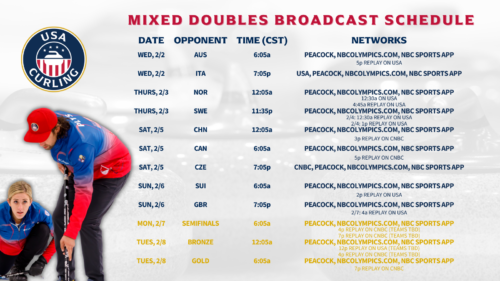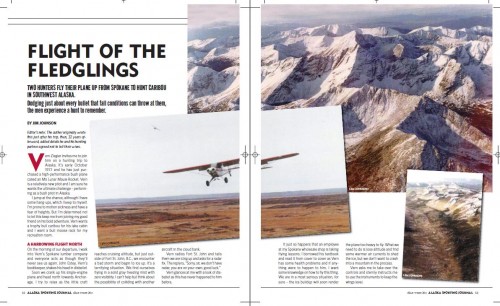
For An Olympic Curler: Last Frontier Comes First Over Land Of 10,000 Lakes
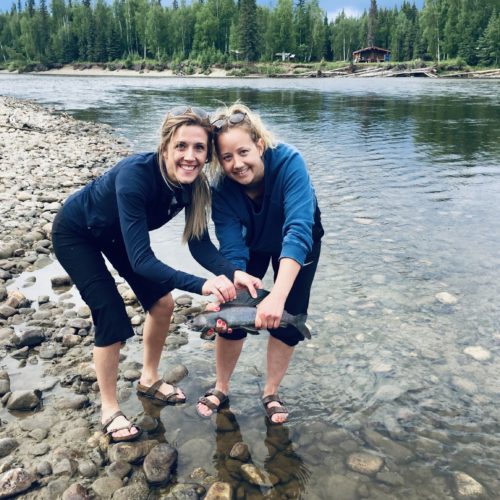
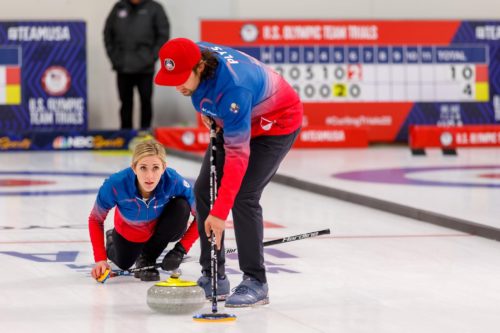
The following will appear in the February issue of Alaska Sporting Journal:
BY CHRIS COCOLES
Meet 29-year-old Vicky Persinger, Fairbanks native, fishing and duck hunting fanatic and a world-class curler.
Er, curler? Yep, someone who curls. Curling, if you didn’t know, is the winter Olympic Games sport staged on sheets of ice using sliding “rocks” and sweeping brooms. It has been described as a cross between lawn bowling and shuffleboard. And while Team USA’s roster for this month’s Beijing Games is dominated by curlers from Minnesota and neighboring Wisconsin – there’s even a debate as to which state is truly the heartbeat of the sport in the U.S., with many curlers leaning towards the Land of 10,000 Lakes over America’s Dairyland to the east – Persinger is proud to call Alaska home and aims to keep it that way.
As one of just a handful of Alaskans to ever make the Olympics in curling, Persinger has no plans to “skip” town (curling team captains are known as skips) for the heart of the curling community in the Heartland of America. The icy Last Frontier comes first for this athlete.
“It is super hard (to leave Alaska). I’ve been pressured to move out of state several times, and being from Alaska is literally the way that I am,” says Persinger, whose event was scheduled to begin on Feb. 2. “I feel crazy proud because I feel like I’m not just representing the U.S.; I do feel like I’m representing our state, our city and my curling club and family. It just makes me beam with pride because it means so much more. I’m just proud to be from here.”
After Persinger narrowly missed qualifying for the 2018 games in PyeongChang, South Korea, she teamed up with her mixed doubles partner Chris Plys to win the U.S. Olympic Curling Trials – held in, you guessed it, Eveleth, Minnesota – last October. And then, because of the Covid pandemic and previous U.S. performances that condensed the qualification process, they had to win a December world qualifying tournament in Leeuwarden, Netherlands, to claim an Olympic spot in China.
Persinger and Plys opened up their event early this morning with a 6-5 victory over Australia and have eight more round-robin games left, including tonight’s 4:05 p.m. (Alaskan time) matchup against Italy that will be televised by USA Network.
Persinger won’t take her first experience on curling’s grandest stage for granted.
“I’m super excited. I’ve been on the national team for eight years and playing in both disciplines – women’s and mixed doubles – and had a close loss in the last go-round. Really it’s been eight years to get here, plus all the additional challenges with Covid,” she says. “I live quite a bit further than anyone else on the national team. Just a lot of obstacles to overcome, and it makes it almost better to make it now after all those challenges.”
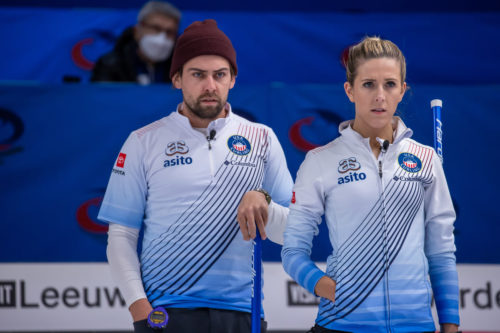
PEOPLE HAVE BEEN SLIDING curling rocks or stones – modern ones should weigh about 42 pounds each in Olympic-level play – in Fairbanks for well more than a century. Scots who came over during the Klondike Gold Rush introduced Alaskans to the sport that originated in 16th century Scotland.
When Fairbanks’ Chena River froze, locals would play as spring approached and conditions were suitable. It was around that time in 1905 when the Fairbanks Curling Club was established. Since then, the club has settled in at its modern indoor location at Kiwanis Park along the Chena.
“We have six sheets of ice, and that’s the most sheets of ice in the state. The next curling club is Anchorage and there’s two sheets,” Persinger says. “But we really have a great club atmosphere. It’s very warm inside. People care about curling, but they also care about people’s highs and lows in life, and they follow along with what everybody’s doing outside of curling as well. And it’s always been like that.”
You can make the argument that the extended Persingers could be the first family of curling in Fairbanks and the state. The sport is a generational tradition for Vicky’s parents Cathy and Ken, grandparents Janelle and Allen, sister Tina and cousins Greg and Chad, with most playing the sport at various levels. (Greg Persinger is a former U.S. champion and longtime national team member, while Tina competed in junior national and world events.)
“We have a big family and a lot of people play league,” says Vicky, whose travel commitments prohibit her from playing in local league events. “My dad and my sister and a couple of my uncles and cousins, there’s probably six to eight of them who play league here in Fairbanks on a regular basis.”
Vicky’s rise in the sport came somewhat methodically. She was a softball player up until she turned 18 and went on to college (she currently works as an IT manager for Fairbanks’ Yukon Title). But winter activities are what you’d expect for a Fairbanks girl. The family owned a snowmachine company back then, so when Persinger and her sister and cousins weren’t riding around on the trails, they were curling.
“And I would say that’s still fairly accurate,” she says of the snowmachining/curling cycle.
Persinger was a skilled enough player early on – after all, curling is in her family’s DNA – that she began competing in the U.S. Junior National championship events from the time she was 13 years old. Representing teams from Alaska, she admits they “weren’t very good” against teams from other more curling-centric states.
Still, she stuck with it all the way through when she aged out at 20. But given that she had no intentions of moving out of Alaska and into those states where curling is everything, Persinger assumed her highest-level competitive career would go away and she’d settle into an Alaskan lifestyle and play league events with her Fairbanks Curling Club gang.
“Curling teams (women’s and men’s teams feature four players) are for the most part self-formed. I wouldn’t call myself shy, but I really didn’t feel comfortable reaching out to these people that I didn’t know very well in trying to get on a team and going out of my way (to join one),” she says.
“I was like, ‘I’m not going to quit curling, but I’m maybe not going to do the competitive stuff.’ I did that for one year and it was so hard to watch what was going on and wanting to be involved with it.”
Timing can be everything, and it was just a year later that USA Curling’s High Performance Team was offering a tryout camp for the first time. There was no doubt this time about giving it a shot.
So Persinger flew to Minnesota and made her bid to reach the next level, though she humbly didn’t expect to crash the party and make it. But she did and has never missed a beat since.
“I think that individual tryout really helped me. I don’t know if I would have gotten on a team without that. And now I know the women and a bunch of the curling community better than I had before,” she says. “So I don’t think I would have gotten that chance without that opportunity.”
With the Olympics being held in China, Persinger’s mixed doubles competition with Plys will occur at odd times for the folks back home in Alaska. But her local club members will be burning the midnight oil to catch her games online or wherever they’re available via NBC Sports coverage.
There’s also a Facebook group called Curling Enthusiasts-Fairbanks, Alaska, which has become something of a Vicky Persinger fan page in the days leading up to the trip to China and during her competition.
“They’ve always been so supportive of me going off and trying to represent the U.S. in as many things as I can,” she says. “They really are all following in their downtime. It’s very genuine support.”
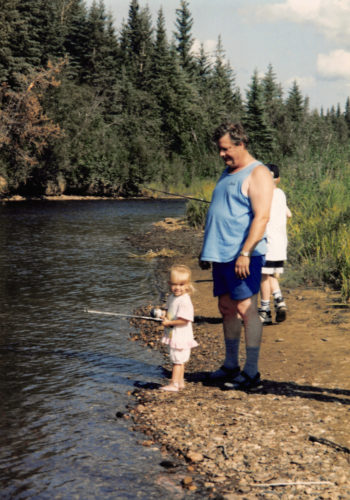
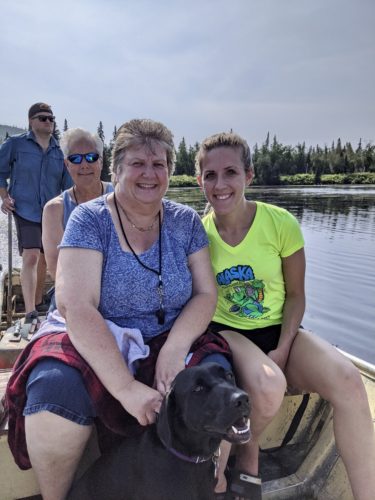
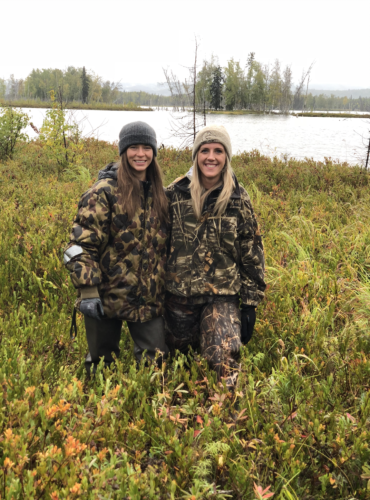
HERS WAS A TYPICAL Alaska-inspired upbringing. The Persinger family is a work-hard, play-hard brood. That’s another facet of life in Vicky’s home state that’s so appealing and difficult to give up.
“I really admire Alaskan people. They are so resilient when they face challenges. They look at work and chores as fun, as sick as that is,” Persinger says.
There would be no shortage of play time in this family. When Vicky wasn’t playing her sports of choice, she’d join the family on getaways to their remote cabins deep in the Alaska Interior. One cabin was hard on a river, the other at a lake.
Like so many kids her age, Persinger’s first fishing experience came with one of those Snoopy child-sized fishing rods and reels. Or sometimes Mom or Dad would hook an Arctic grayling, their common target, and hand the rod to young Vicky or sister Tina to get the feel of the reel and the fish on the other end.
“I just think of sitting on the back of the boat or on the riverbank, and it’s chaos,” Vicky says when describing those days. “There are dogs running, my mom has snacks for all of us and whoever we have at the river with us. The river cabin takes an hour in a boat to get there, so we’re really out of the way and away from civilization.”
That’s kind of typical to what goes on even now with the Persinger adults. But this is what you do when living in this state. Theirs is a simple life but also the good life. Get in the boat, find a sandbar to beach at, break out the fishing gear and the chairs, let the pups run amok, play some music on the speakers and just chill out.
And it’s not so much about catching fish as it is just getting out of the city, recharging and spending time together as a family in the Alaskan backcountry. Since the curling season requires Persinger to burn a lot of her vacation days to account for trips to tournaments and other commitments in winter, she doesn’t take for granted the time off she does get for cabin retreats.
“Being outdoors and taking trips to our cabins, it’s really about the peace that you feel and the joy of having nowhere to go,” she says. “Nothing that needs to be done and being with your family. Super resetting for me.”
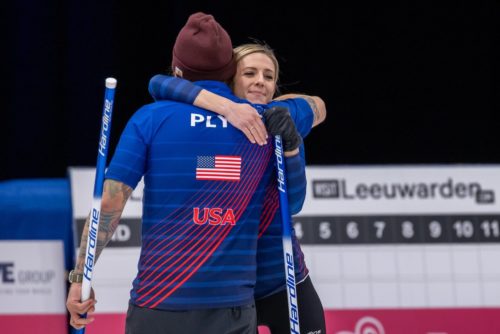
PERSINGER’S ROAD TO BEIJING essentially started when she came up just short of the 2018 PyeongChang Winter Games. She competed in the U.S. Olympic Trials with both a four-member women’s team and the two-player mixed doubles, finishing second and third, respectively.
But while it motivated Persinger to give it another go for 2022, coming up short also offered valuable perspective.
“Especially early on, I really focused on the Olympics as the main goal, (and) after I lost the last trials, it was obviously very emotionally devastating for me. But it made me realize there are a lot of moving parts and pieces along the way,” she says. “They weren’t the Olympics, but they’re a huge part of why I play and that they are fun. Obviously the Olympics are the pinnacle of our sport, but there are a lot of good things that come along the way.”
Her previous mixed doubles partner had retired, but she found a kindred spirit in Plys, another in the Minnesota curling pipeline. The now 34-year-old was a 2010 Olympian but also had his share of close defeats, providing somewhat of a similar backstory to his new partner.
“Chris asked me if I wanted to play doubles. I knew Chris and I thought, ‘Sure; why not?’ And our first year together, we lost the nationals final,” she says. “That’s when I realized that if we put in a little work we might be able to do well. And we have since then.”
The 2021 Olympic Trials final between Plys and Persinger and the team of Jamie Sinclair – she was coincidentally born in Anchorage to a Canadian father but grew up in Canada – and Rich Ruohonen represented one of the most emotional roller coaster rides of Persinger’s career.
Unlike the more tightly contested games of four-person women’s and men’s competitions, two-player mixed doubles contests are often more wide-open, high-scoring affairs. Just one player is able to use the broom to sweep away ice and help guide the shooter’s rock down the roughly 150-foot sheet and either avoid, block or knock out opponents’ rocks and get as close as possible to the center bull’s-eye, known as the button.
And in a taut, back-and-forth game, Persinger was having a difficult time finding her stride. “Horrible” was the player’s description of her play more than halfway through.
“I had really struggled for the whole final and it was really hard for me to kind of swallow and accept,” she says. “And I’m very hard on myself, so I was kind of beating myself up inside.”
“I took a couple steps back and looked up at the scoreboard and just told myself, ‘It’s not as bad as it feels.’ You feel like you’re losing by 10 and you look at the scoreboard and you’re up by one or down one. I had to reposition myself and look at the bigger picture and understand that there were still X amount of rocks left in the game.”
Traditionally men’s and women’s team games last 10 ends – curling’s term for innings or periods – but there are just eight for mixed doubles. Persinger admits the first five of those weren’t her best work.
“And then I really picked it up for the last three ends and made a really good shot in the last end,” she says.
Curling’s last shot attempt of each end – teams throw five rocks each during the ends – is known as the hammer, giving whoever has that last shot the perceived upper hand to score the critical points. And it just so happened that Persinger, her earlier misfires still potentially hovering, possessed the hammer with a chance to break a 6-6 tie and clinch the trials for her and Plys.
Sinclair and Ruohonen had two rocks right around the button with a Persinger-Plys rock just outside of scoring position. It would arguably be the biggest shot of Persinger’s career, and if she could knock away all three of the other stones and place hers in position to score, the game would be theirs.
“The final rock of the eighth end; tied at six on the finger tips of Vicky Persinger and a possible trip to the Netherlands,” the NBC Sports announcer said, adding to the drama of the moment.
“Hard! Hard!” Persinger shouted as her partner furiously swept in front of the sliding rock. It did exactly as the thrower hoped it would, taking out all three of the rocks and stopping within the circumference of the button to end it with a single point.
“It looked pretty straightforward maybe if you’re not a curler, but there was really not a lot of room for error. The best shots in curling are when you have a series of options and you can put it in a couple different places and still make the shot,” Persinger says. “And that one was, ‘I’m either making it or not.’ We looked at the angles and thought it was our best option and I threw it. We were very relieved when we were the last rock sitting there in the 4-foot (area that scored the winning point).”
Then, during a postgame interview, Persinger teared up.
“It was a very odd game to win emotionally just because, 1) It guaranteed in no way that we were going to the Olympics (yet) and that our road wasn’t over,” she said in early January while in self-quarantine at home leading into the China trip. “And 2) The game itself was such an emotional roller coaster with my struggles and the scoreboard going back and forth. I didn’t really have an inkling that we were for sure going to win until the game was over.”
That crazy ride almost made the Netherlands qualifying tournament seem anticlimactic, despite Persinger and Plys not only having to go through a round robin preliminary round (they went undefeated) but also win a semifinal and final match against a tough Russia team.
Persinger became just the second Olympic curler from Alaska to qualify, joining Anchorage’s Jessica Schultz who represented Team USA in 2006 and 2014. Fairbanks-born Colin Hufman is also the men’s team alternate going to Beijing with Plys, who is doubling up on events.
“The U.S. trials, that was maybe the toughest doubles field I’ve ever had to play in. Every single game was a grind and you’re kind of holding your breath until it’s over. The competition maybe wasn’t quite as good in the Netherlands, but the games were just as important,” she says. “But I do think that throughout my curling career, every event is like a learning moment and taking what that pressure felt like in that (trials) final and learning from it, I feel like I did much better in the Netherlands.”
When the team was interviewed on an episode of USA Curling’s The Whole Spiel podcast, Plys talked about what makes for a good mixed doubles duo.
“First and foremost, you have to be a good shooter … And then it’s incredibly important to be as good a teammate as you can out there,” he said of the two-player format compared to the larger men’s and women’s groups. “And just understanding that there’s massive swings in mixed doubles, being able to weather those and to keep your cool and composure the best you can. And I think that’s something we do pretty well.”
And this team will certainly head to Beijing battle-tested, considering the pressure-packed domestic trials final and overcoming the field in the Netherlands. Persinger is sure it will benefit their cause to contend for an Olympic medal.
“I love this ‘practicing pressure,’ I call it, if that makes sense,” she says. “Because it’s going to be totally helpful when we get over there.”
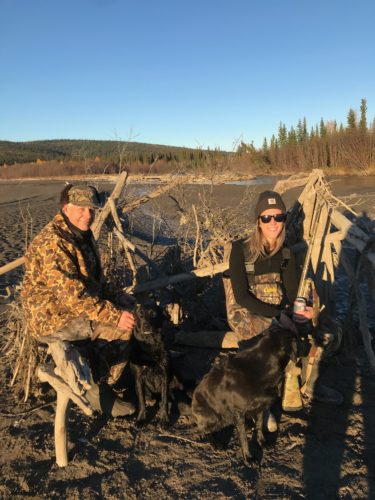
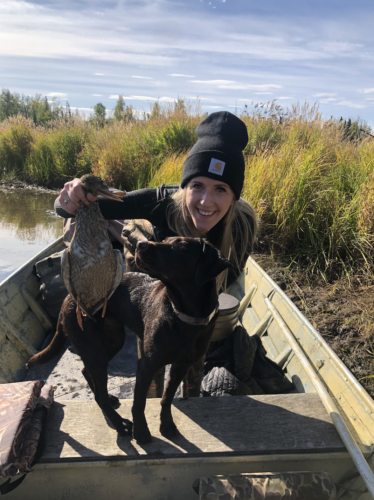
IF IT’S SEPTEMBER, THE father-daughter duck hunting trip is on. No exceptions. Ken and Vicky have been doing it for as long as they can remember.
“My dad started taking me duck hunting when I was 9. And I have been hunting with him every single year since then. This last September was my 20th year in a row going out duck hunting with him,” Vicky says.
You don’t have to remind her curling national team contemporaries back in Minnesota and Wisconsin that the trip is going to happen come hell or high water.
When she’s back in Minnesota during curling-related events or training, everyone else now knows when the Alaska kid will head back west and north for a weekend in September to hit the waterfowl blinds with her pop.
“They (first) asked why, and I said, ‘Well, I have to go hunting with my dad.’ They looked at me and were like, ‘Really?’ ‘Yeah. I have not missed a single year, and going up to Alaska for five days to go hunting is not going to ruin our chances.’ It’s something that’s really important to me, and I make sure to make the time to do those things.”
“I’m a terrible shot – just horrible. The effort is there. But a lot of it is just being away from other people, being outdoors and finding that peace and joy that comes with just adventuring and being with the people you love.”
Persinger tries to make time to join in with her dad’s passion as a private pilot. And Ken proudly taught Vicky to drive the family boat, even to navigate the sometimes turbulent waters of their home river, the Tanana.
“It’s a scary river, but what’s cool about that is my dad has been teaching me how to drive on that just so eventually, some day when he’s gone, I’m going to know how to get to the cabin and to get my mom and my sister out there. That’s how both my parents have raised me: to just get out there and do it,” Persinger says.
“They don’t really care that I’m not a boy and driving the boat is supposed to be a man thing. We were pulling in somewhere and Dad goes, ‘OK, drop the anchor.’ Whoever is with us will go, ‘I can get it.’ And my dad says, ‘She’s got it.’ That’s something that we’ve been taught to do. And I think what’s really cool about being an Alaskan woman is that gender only means so much up here. You’re kind of expected to go along and hang tough with everybody. And I like that. I think that helps me as an athlete.”
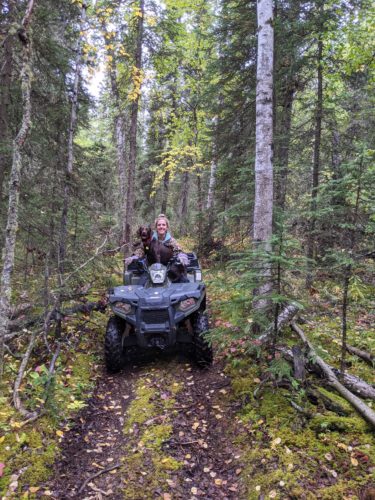
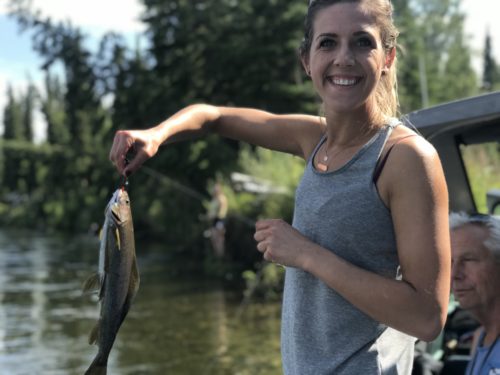
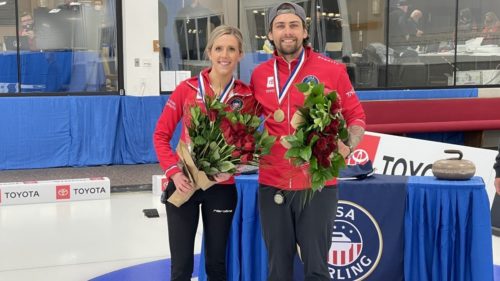
THERE’S A TRAIL ADJACENT to one of the Persinger cabins. It’s as remote as you’d expect when understanding that the property itself is only accessible via boat or bush plane. The Persinger clan loves to go four-wheeling there.
“We just love packing a sandwich, cutting trees that have fallen across the trail and just breaking trail and exploring. We’ve never gotten to the end of the trail, so we just keep doing it. We bring the dogs, and that is fun to me, which is kind of messed up,” deadpans Persinger, who was asked if she’s curious about someday following the trail as far as it goes.
“It’s a very old trail, so I just sit at the cabin thinking, ‘Where does it stop?’”
Persinger’s answer might just provide a clue about why she is too much of an Alaskan to put down roots anywhere else. Minnesota and Wisconsin might be America’s unofficial cradle of curling, but Alaska is home.
There are more fish to catch – Persinger wants to go on a halibut trip again (“It was truly one of those days where at the end of the day my face hurt from smiling literally all day long”) – and Ken has invited his daughter to go moose hunting sometime despite Vicky’s reluctance to take the shot. (”I kind of don’t want to go moose hunting, but then I kind of do, if that makes sense. I would enjoy calling it in and all that, and I’d probably be cool being the support staff.”)
Beijing is a chance for her and Plys to win just the third curling medal in United States’ history, but the beauty of living in Fairbanks, the cabins, the duck hunts, the fishing trips, the trail with the unknown ending point – it’s all quite the medal podium on its own. ASJ
Editor’s note: Schedules for Vicky Persinger’s and Chris Plys’s mixed doubles event at the 2022 Winter Olympics can be found at usacurling.org/press-releases/2022-beijing-schedule (and see below). Follow Persinger on Twitter and Instagram (@vrpersinger). For Fairbanks Curling Club information, go to curlfairbanks.org.
